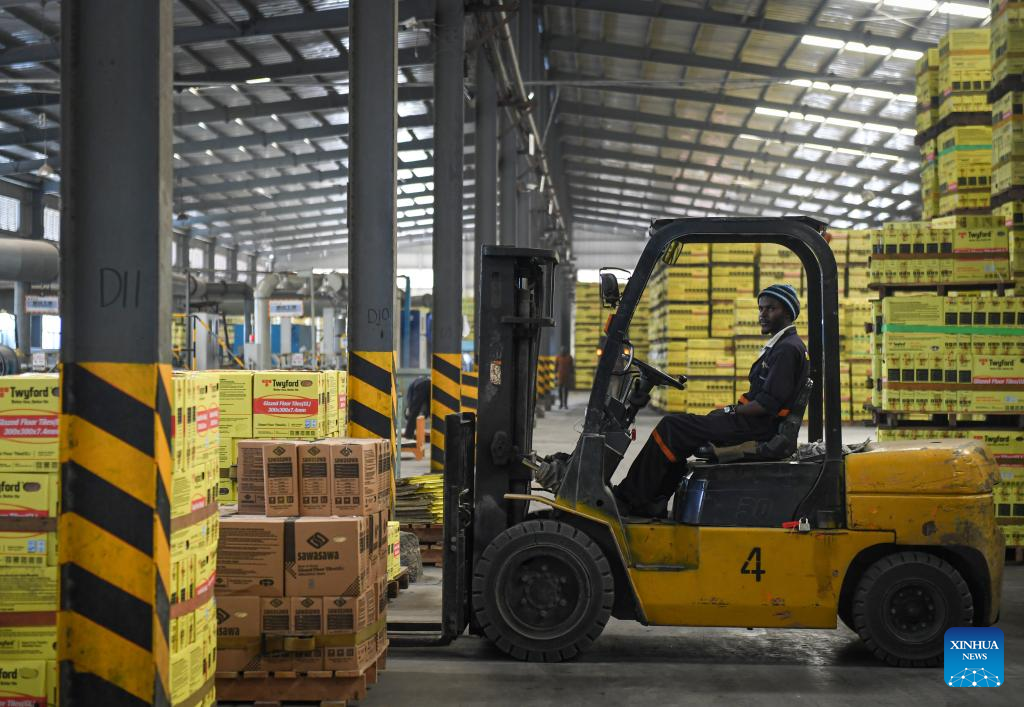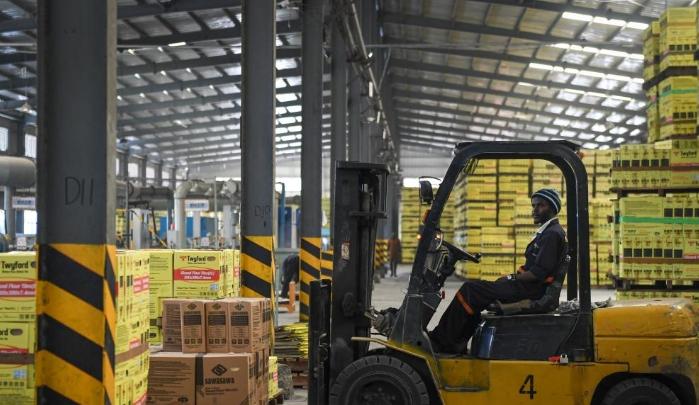A forklift transfers tile packages at the KEDA (Kenya) ceramics factory in Kajiado County, Kenya, on May 17, 2024. (Xinhua/Li Yahui)
by Naftali Mwaura
NAIROBI, June 3 (Xinhua) -- On a sunny afternoon, workers at KEDA (Kenya) Ceramics Company Limited, located about 70 kilometers south of the Kenyan capital of Nairobi, were busy with packing floor tiles in multicolored cartons for onward shipment to clients' premises.
Founded in 1992, KEDA Industrial Group, a China-based company principally engaged in the manufacture and sales of building material machinery, established the KEDA ceramics factory in Kenya's southern county of Kajiado, in a joint venture with China's Guangzhou Sunda in 2016.
Li Ruiqin, managing director of KEDA (Kenya) Ceramics Company Limited, said their investment in the production of high-quality floor tiles has served as a model for revitalizing the local manufacturing sector to spur economic growth and job creation.
According to Li, establishing a ceramic tile factory in rural outposts has unleashed benefits to the local economy, citing hotel and transportation businesses that have bloomed since the factory's establishment.
"As our footprint in the Kenyan market expands, KEDA has adhered to local policies and regulations besides investing in community empowerment projects including schools, roads and water supply," said Li during an interview with Xinhua at the KEDA ceramics factory.
Li disclosed that KEDA has set up two ceramic tile factories, one in Kajiado County and another in Kisumu County, and an additional sanitary ware factory, all covering a landmass of 300 acres (about 1.2 million square meters).
The two ceramic tile factories have a daily production capacity of 110,000 square meters of floor tiles while the sanitary ware factory produces 4,500 pieces of sanitary wares daily.
He announced that they have plans for three to five production lines in years to come, thus acquiring another 95 acres of land neighboring them. They also plan to build a solar-powered plant in Kajiado.
He also noted that KEDA has been offering training and apprenticeships to local youth, with some being deployed to China for short courses in line with its corporate social responsibility ethos.
Li said, "The three factories have more than 3,000 employees, 95 percent of whom are Kenyan citizens, and they indirectly provide livelihood to more than 50,000 people."
By leveraging Chinese technology and standards, KEDA has always adhered to sound ecological stewardship, recycling 400 cubic meters of water daily, according to the company's briefing materials.
Richard Okello, a 35-year-old supervisor at the KEDA ceramics factory, said leveraging Chinese technology to produce outstanding floor tiles has boosted Kenya's affordable housing agenda, re-skilled local youth and created jobs.
"This company has created a lot of jobs. It has provided a new model of skills transfer and now we have new technology for tile production," Okello said. "What I can say is that Chinese companies are the best in terms of production. I have learned a lot about how ceramic tiles are made from raw material to finished products."
Kenya aims to boost the contributions of the manufacturing sector to the country's gross domestic product (GDP) from the current 7 to 20 percent by 2030, said Kenyan President William Ruto.
In addition, Ruto insisted that the implementation of the affordable housing agenda was on course, with the government targeting to construct a minimum of 200,000 units annually.
John Misiore, a 26-year-old sorter at KEDA, said the company's flagship products, including floor tiles, have boosted industrialization and construction of modern homes in the country.
Misiore, an agricultural engineering major, added that through skills and technology transfer to local youth, KEDA has also injected vitality into Kenya's quest for industry-led growth that promises jobs and shared prosperity.
The company is devoted to the concept of sustainability and has adopted best practices in waste reduction and recycling of waste to boost Kenya's transition to a circular economy.





 A single purchase
A single purchase









